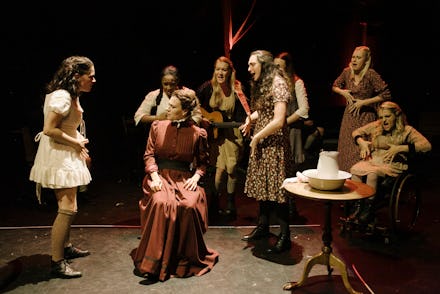Why This Musical Isn't Just for Deaf People — It's for Everyone

Some may think a good musical theater experience requires the audience to hear every note performed, but groundbreaking theater company Deaf West is challenging this notion with its adaptation of Tony Award-winning musical Spring Awakening.
The Los Angeles-based company — reportedly the first professional resident Sign Language Theater in the western U.S. — has been staging shows featuring hearing and deaf actors since it was founded in 1991. While all of their productions have certainly been innovative, the theater's current production of Spring Awakening, directed by Michael Arden and currently in its second run at the Wallis Annenberg Performing Arts Center, is being hailed as something truly special — especially for its largely unprecedented approach to incorporating deafness into the production.
Deafness isn't just accommodated, it's incorporated. Most well-intentioned efforts to welcome individuals with disabilities involve making mainstream institutions, spaces and/or experiences accessible. Often, individuals with disabilities can exist in these spaces, but they're not truly integrated into them, as evidenced, for example, by the addition of a sign language interpreter or, in theater, separate performance communities for the disabled.
But Deaf West's production of Spring Awakening rejects this, incorporating deafness as a theme and hiring deaf actors, recognizing that doing so augments the production itself. Both deaf and hearing actors perform choreography that uses sign language, and all hearing-impaired actors sign in time with the music to signify a musical performance to deaf audience members.
"Deaf actors are treated as deaf people in the world of the play," cast member Sean Grandillo, a hearing actor, explained to Mic. "Their signing is always either voiced by a hearing actor or projected, but they are still deaf characters as much as they are deaf actors. The deafness of some of the key characters really raises the stakes of the play, and makes the emotional journey of the show (that was part of its initial success) even more effective."
"It's been awesome to work on explaining and expressing the music and how it affects the story to actors who can't hear it," Grandillo added. "At times I'm sure an audience member could forget there are deaf actors onstage, and the re-realization that these actors are deaf must be a wave of emotions and thoughts that I'm honestly envious of."
Deafness actually augments the existing themes of the piece. Spring Awakening, a musical set in late 19th-century Germany, explores the experience of coming of age in the context of a sexually repressive society, where ignorance about sex is common. The rock-pop score highlights the teen characters' angst about their newfound contention with homosexuality, abortion, suicide and sexual awakening.
"To me, the play speaks to those who are denied a voice, to those who don't fit into the norm, to those who are questioning and experiencing the pains of growing up," director Michael Arden wrote in his note to audiences. "What better metaphor than deaf and hearing cultures?" he asked in a promotional video about the production.
The era in which Spring Awakening is set was not just repressive in terms of sexuality, but for the deaf community as well: It is known as the "Dark Age of Deaf Education," as sign language was banned in schools. Influenced by Darwinian notions of the survival of the fittest, oralism — or the exclusive use of lip reading and speech as opposed to manual signing — was largely mandated during this period, according to PBS.
Struggles surrounding identity, repression and expression as considered through the lenses of sexuality and ability, therefore, are mutually reinforcing themes that ultimately bolster the piece. The characters' struggle to physically communicate and understand each other underscores the ways in which they struggle to learn about sex.
For example, one of the main characters, Moritz, grapples with both his burgeoning sexuality and communicating with his hearing parents as a deaf son. The now-deaf female protagonist, Wendla, struggles to understand her mother's attempts to talk about sex through sign language. These characters' internal struggles are made beautifully, subtly, clear through the art of their physical performances and through the lens of their physical disabilities.
The show is "about everybody trying to communicate as best they can these hugely passionate feelings and feeling like they're not being heard," Patti Wolff, interim artistic director at the Wallis Annenberg Center said in their promotional video.
The result is a uniquely inclusive, moving performance that's more than just entertainment. The goal of the production is to tear down "barriers of culture and language in order to offer a higher truth in storytelling," Arden wrote in his director's note, provided to Mic. "To me, that is the true definition of what theater should do."
As deaf Spring Awakening cast member Daniel Durant told the Los Angeles Times in September, "To me we're hitting our goals when the audience forgets about deaf or hearing, gay or straight, this or that, but experiences the characters as human beings and the universal joy, pain, ups and downs of what it is to be living — and in this play, growing up."